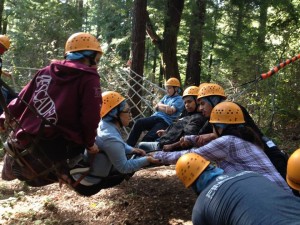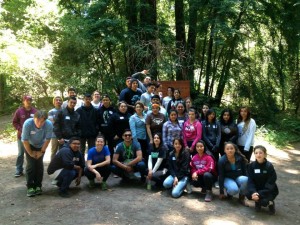When Ana Polacek hears her ESL students talk about their English language slip-ups, the humiliation of a botched conversation or a forgotten vocabulary word, she encourages them to persevere. But she also recognizes their frustrations.
“My dad came from India and my in-laws came from Argentina. None of them spoke English. So I let them know: I understand how hard it is,” she says.
Two days a week, from 10 a.m. to noon, Ana volunteers with Puente, teaching ESL to mostly mothers who want to get better at speaking English so they can better connect with their children’s teachers, improve job skills, engage in the larger community, and help their families thrive.
“It’s not just about learning for fun – it’s a necessity. ‘How do I go to the grocery store and ask for a product? How do I talk to my son’s teacher?’ It’s important for them to learn this so they won’t be disenfranchised.”
Ana teaches one of four classes in Puente’s ESL program. The other three occur at night and tend to draw farm workers, who are mostly men. The program has nearly 100 students.
Some of Ana’s students have been with her since she started teaching at Puente four years ago. It’s a lighthearted class, with plenty of laughter and joking. But they also discuss serious matters in their children’s lives, like how to handle schoolyard bullies or bad grades. Ana is a mother too, so that’s another point of commonality.

Mike and Ana Polacek
Ana and her husband Mike live on a hobby farm just outside Pescadero’s main drag, in a house they worked on patiently for years and built from the ground up. The same attitude applies to their work in the community. Ana has teaching credentials in social studies and math, and has taught ESL in countries as diverse as Spain and Japan. She could teach anywhere, but she chooses to invest herself in Pescadero. She and Mike also support Puente throughout the year with funds to help locals buy school supplies, Christmas gifts, and warm clothing for local farm workers.
“There are so many worthy organizations to donate to. We choose to donate locally. Why not help our immediate community?” she says.
Mike Polacek agrees. The couple became aware of Puente at a local house party four years ago, which was hosted by a friend. After that, Ana began working with Puente, while Mike joined the board of PMAC, the Pescadero Municipal Advisory Council, which works with the county to solve problems affecting the area and its residents.
Mike is PMAC president this year. With years of experience in the tech sector and the financial services industry, he joined the board to help improve the strained relationship between PMAC and the county. He can, and does, go “toe to toe” with officials who sometimes overlook his rural area. He took on the issue of flooding in town – a seemingly intractable problem, but one where Pescadero has made some progress in the past three years.
“Making a little bit of a dent in a big problem may seem silly, but it does make a difference. You can’t solve everything, but you can solve something,” he explains.
Here in town, Mike has seen people help keep each other’s tractors going, or rush to donate food and clothing to neighbors who lost everything in a fire. At one point, two Spanish-speaking farm workers helped Mike and his wife pull their car out of a ditch.
It’s the same with Puente, he adds. “Puente really fills a huge gap that people need. It’s always nice to be able to see results, to see people helping each other. Today you write a check to a big organization and you never know where it goes.”
Ana’s favorite moments come from seeing her students go out into the world and get things done without fear or embarrassment. “One student told me she was translating for her husband at a DMV appointment. It gave her confidence. She said she knew it wasn’t perfect, but she did it.” Other ESL students can now understand their children’s homework and text messages. They’re connecting with their families in new ways.
In the next couple of years, Ana will transition out of her role at Puente and into a new position at Pescadero Middle and High School: substitute teacher. But she and Mike will maintain their ties to Puente, and encourage others to volunteer or donate as they can. “He thinks it’s just as important as I do that we spend time to make our community better,” she says.








